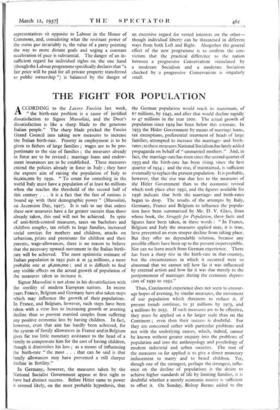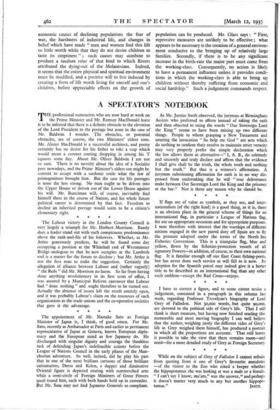THE FIGHT FOR POPULATION
ACCORDING to the Lavoro Fascista last week, " the birth-rate problem is a cause of justified dissatisfaction to Signor Mussolini, and the Duce's dissatisfaction is like a sharp blade to the generous Italian people." The sharp blade pricked the Fascist Grand Council into taking new measures to increase the Italian birth-rate. Priority in employment is to be given to fathers of large families ; wages are to be pro- portionate to the size of families ; the measures already in force are to be revised ; marriage loans and endow- ment insurances are to be established. These measures extend the policies already in force in Italy ; they have the express aim of raising the population of Italy to 6o,000,000 by 195o. " To count for something in the world Italy must have a population of at least 6o millions when she reaches the threshold of the second half of this century . . . it is a fact that the fate of nations is bound up with their demographic power " (Mussolini, on Ascension Day, 1927). It is safe to say that unless these new measures have a far greater success than those already taken, this end will not be achieved. In spite of anti-birth-control measures, taxes on bachelors and childless couples, tax reliefs to large families, increased social services for mothers and children, attacks on urbanism, prizes and premiums for children and their parents, wage-allowances, there is no reason to believe that the necessary upward movement in the Italian birth- rate will be achieved. The most optimistic estimate of Italian population in 1951 puts it at 54 millions, a more probable one at 46,000,000 ; and it is difficult to find any visible effects on the actual growth of population of the measures taken to increase it.
Signor Mussolini is not alone in his dissatisfaction with the sterility of modern European nations. In recent years France, Belgium and Germany have also taken steps which may influence the growth of their populations. In France, and Belgium, however, such steps have been taken with a view less to increasing growth or averting decline than to prevent married couples from suffering any positive economic loss by having children. In fact, however, even that aim has hardly been achieved, for the system of family allowances in France and in Belgium gives far too little monetary assistance to the head of a family to compensate him for the cost of having children, though it diminishes his loss ; as a means of influencing the birth-rate " the most . . . that can be said is that family allowances may have prevented a still sharper decline in fertility."
In Germany, however, the measures taken by the National Socialist Government appear at first sight to have had distinct success. Before Hitler came to power it seemed likely, on the most probable hypothesis, that the German population would reach its maximum, of 67 millions, by 1945, and after that would decline rapidly to 47 millions in the year 2000. The actual growth of population since 1929 has been below this estimate. In 1933 the Hider Government by means of marriage loans, tax exemptions, preferential treatment of heads of large families, attempted to increase the marriage- and birth- rates ; to these measures National Socialism has lately added propaganda on behalf of "unmarried mothers." And, in fact, the marriage-rate has risen since the second quarter of 1933 and the birth-rate has been rising since the first quarter of 1934 ; and the rise, if maintained, is sufficient eventually to replace the present population. It is probable, however, that the rise was due less to the measures of the Hitler Government than to the economic revival which took place after 1932, and the figures available for 1936 indicate that both the marriage- and birth-rates began to drop. The results of the attempts by Italy, Germany, France and Belgium to influence the popula- tion have been summarised by Mr. D. V. Glass, from whose book, the Struggle for Population, these facts and figures have been taken, in these words : " In France, Belgium and Italy the measures applied may, it is true, have prevented an even steeper decline from taking place. But they offer no dependable solution, because any possible effects have been up to the present imperceptible. Nor can we learn much from German experience. There has been a sharp rise in the birth-rate in that country, but the circumstances in which it occurred were so abnormal that we cannot tell how far it was influenced by external action and how far it was due merely to the postponement of marriages during the economic depres- sion of 1930 to 1932."
Thus, Continental experience does not seem to encour- age hopes of averting, by similar measures, the movement of our population which threatens to reduce it, if present trends continue, to 31 millions by 1975, and 4 millions by 2035. If such measures are to be effective, they must be applied on a far larger scale than on the Continent ; even then their success is doubtful. For they are concerned rather with particular problems and not with the underlying causes, which, indeed, cannot be known without greater enquiry into the problems of population and into the anthropology and psychology of modern industrial and urban societies. The root of the measures so far applied is to give a direct monetary inducement to marry and to breed children. Yet, though one of the strongest, perhaps the strongest, influ- ence on the decline of populations is the desire to achieve higher standards of life by limiting families, it is doubtful whether a merely economic motive is sufficient to offset it. On Sunday, Bishop Barnes added to the economic causes of declining populations the fear of war, the harshness of industrial life, and changes in belief which have made " men and women find this life so little worth while that they do not desire children to taste its emptiness " ; such causes may combine to produce a taedium vitae of that kind to which Rivers attributed the dying-out of the Melanesians. Indeed, it seems that the entire physical and spiritual environment must be modified, and a positive will to live induced by creating a form of life worth living for oneself and one's children, before appreciable effects on the growth of population can be produced. Mr. Glass says : " First, repressive measures are unlikely to be effective ; what appears to be necessary is the creation of a general environ- ment conducive to the bringing up of relatively large families. Secondly, if there is to be any significant increase in the birth-rate the major part must come from the working-class. Consequently, no action is likely to have a permanent influence unless it provides condi- tions in which the working-class is able to bring up children without thereby suffering from economic and social hardship." Such a judgement commands respect.















































 Previous page
Previous page